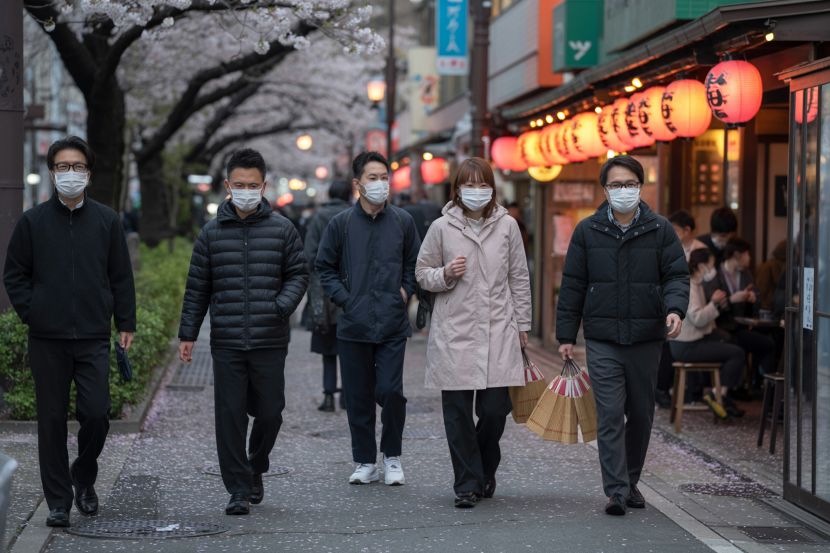Home » ASIA » Influenza Surge in Japan and Growing Concerns in India: Travel Tips for Protecting Yourself Across Asia
Published on
October 13, 2025
As the flu season arrives earlier than expected in Japan, there’s rising concern about the potential for a global health issue, especially as the outbreak has already led to more than 4,000 hospitalizations. The flu is spreading rapidly across the country, affecting schools, workplaces, and health systems. While the outbreak is currently seasonal, with the familiar H3N2 strain being the primary culprit, experts warn that the rapid spread could serve as a warning for other countries like India, where the flu season is just beginning. In this article, we explore what travelers need to know and how the surge in flu cases in Japan may impact tourism, particularly in regions with similar seasonal challenges.
The Flu Outbreak in Japan: What’s Driving the Surge?
This year’s flu surge in Japan, which started earlier than usual, has been attributed to several factors. The spread of a stronger strain of the virus, the impact of fluctuating immunity levels due to years of limited exposure during the COVID-19 pandemic, and unpredictable weather conditions have all contributed to the rise in cases. Experts believe that the H3N2 strain, which has caused the current outbreak, has gained more potency. Additionally, inconsistent vaccination practices post-pandemic have left more people vulnerable to flu infections.
The early arrival of flu cases in Japan signals a shift in how the virus is behaving, particularly in terms of timing and transmission. The Japanese health system is under pressure, with schools closing and hospitals overwhelmed by the sudden increase in patients. This situation has prompted calls for more vigilance across Asia as the flu virus shows signs of adapting to changing environmental factors.
What Does This Mean for India and Asia?
While Japan is currently at the forefront of this early flu wave, countries like India may face similar challenges, especially with the upcoming festival season that encourages large gatherings and travel. In India, flu cases are already on the rise, particularly in the northern and eastern regions, with some areas reporting more cases of H3N2 alongside symptoms like prolonged cough, fatigue, and high fever.
Unlike Japan’s sharp winter flu season, India’s warm climate doesn’t follow a strict flu schedule. However, the country typically experiences an uptick in cases from October to February, during the cooler months when respiratory infections are more common. As the festive season approaches, with increased travel and indoor gatherings, there’s concern that flu infections may spread more quickly in crowded places.
India’s lower flu vaccination rate compared to other nations makes the situation more concerning. Experts suggest that increased awareness and preventive measures, including vaccination campaigns, are crucial to avoid a significant outbreak. With international travel becoming more frequent and flu cases rising globally, travelers from both Japan and other countries need to be cautious and aware of the risks.
What Should Travelers Do During the Flu Season?
Travelers visiting Japan, India, or other parts of Asia should be proactive about flu prevention. Here are some key steps to stay safe:
1. Get Vaccinated Early
Flu vaccines are the best line of defense, especially for vulnerable populations, including young children, elderly individuals, pregnant women, and those with underlying health conditions such as heart, lung, or diabetes issues. Travelers should make vaccination a priority, particularly if they plan to visit flu-affected regions.
2. Stay Home if You Feel Unwell
Even mild flu symptoms can easily spread the virus. If you’re feeling unwell during your travels, it’s essential to rest and avoid close contact with others. Wearing a mask in public places can also help reduce the spread of the virus.
3. Ensure Proper Hygiene and Ventilation
During your travels, make sure to wash hands regularly, use hand sanitizers, and disinfect high-touch surfaces. For hotel stays or crowded tourist spots, ensure there is adequate ventilation in enclosed spaces.
4. Stay Hydrated and Nourished
A well-balanced diet, rich in fruits, vegetables, and vitamin C, can help boost your immune system and make you less susceptible to infections. Hydrating adequately, especially in dry environments, will also help maintain overall health.
5. Seek Medical Help Promptly
If symptoms worsen or don’t improve after a few days, seek medical attention. Antiviral treatments work best within the first 48 hours of symptom onset, so acting quickly can make a significant difference.
The Impact of Flu Outbreaks on Tourism and Travel
Flu outbreaks not only affect public health but can also influence the travel and tourism industry. Countries experiencing sudden flu surges, such as Japan, may face travel disruptions. Tourist destinations could see a decline in foot traffic due to health concerns, while hotel stays and events might be canceled or postponed. This can affect international tourism, particularly in areas with large numbers of flu cases.
For tourism authorities in places like India, which already faces challenges related to seasonal flu, it’s important to boost awareness around flu prevention and vaccination. This will ensure that travelers remain informed and can take preventive steps to protect themselves during their visits. Tour operators and hotels can also play a crucial role by promoting health practices among tourists, such as making hand sanitizers available and providing information on local health guidelines.
Final Thoughts: Stay Prepared, Stay Safe
While the current flu outbreak in Japan is seasonal, it’s a reminder of how quickly viruses can spread across borders. With countries like India facing an uptick in flu cases and a lower vaccination rate, preparedness is key to mitigating the impact. As the flu season unfolds, travelers should make flu vaccination a priority, follow safety guidelines, and stay informed to reduce the risk of infection.
Increased awareness and early prevention are crucial to ensuring that flu remains just a seasonal issue, and not a potential global health crisis. By staying vigilant and responsible, travelers and locals alike can protect themselves and continue to enjoy a safe travel experience across Asia and beyond.

